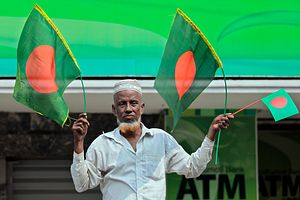Predicting election outcomes is difficult enough in data-rich and stable electorates like the United States. With very little reliable polling data, and a history of at least one military coup roughly every decade, analysts covering Bangladesh’s upcoming elections need to approach the exercise with humility and circumspection. This year, assessing political fortunes in Bangladesh may become even more challenging, as an aspiring political movement seeks to upend the dynamics that have shaped Bangladeshi politics for decades.
A recent national opinion poll conducted by the International Republican Institute (IRI) found significant support for current Prime Minister Sheikh Hasina and the Awami League, but it also showed some vulnerability. While 62 percent of respondents reported that they feel the country is going in the right direction, that’s down from 75 percent a year ago and the lowest it has been in three years. And there has been an increase in the number of people who refuse to answer certain questions: 40 percent of respondents declined to say whether they thought political stability would improve or worsen, compared to 29 percent last year. But even with some drop off, the poll results should be reassuring for the governing party after weathering massive backlash over the response to transportation protests in August.
A new twist has appeared on Bangladesh’s political scene, though, in the form of Kamal Hossain. A former Awami League minister, Hossain split off and formed his own political party, Gano Forum, in the early 1990s. In 2007, Hossain supported a military coup, declaring that through suspending elections, “the law has returned to Bangladesh.” He is well known and respected in Washington, where in 2016 his daughter, Sara, was presented the Secretary of State’s International Women of Courage Award. Last month, U.S. Ambassador Marcia Bernicat attended a private dinner in Dhaka where Hossain was also a guest.
For over a decade, Kamal Hossain has largely worked behind the scenes in Dhaka, proving a headache for the Awami League after they returned to power. Hossain’s son-in-law, English journalist David Bergman, is an eloquent and acerbic critic of the Awami League whose op-eds on Bangladeshi politics have appeared in influential international journals including The New York Times and The Economist. Today, though, Hossain is moving into the spotlight as he prepares to contest elections expected later this year.
By himself, Hossain is not likely to have much of an impact on election outcomes. Bangladeshi politics is still largely driven by patronage, and, so far, he has little to offer outside of drawing rooms and diplomatic dinners. But Hossain is shrewd, and his recent actions, if successful, could change Bangladesh’s political landscape for a generation.
In recent months, Hossain has joined forces with a newly formed political alliance calling itself “Jukta Front.” Jukta Front is led by former Bangladesh president and minister of foreign affairs under the Bangladesh Nationalist Party (BNP), A. Q. M. Badruddoza Chowdhury, and includes both former BNP and Awami League officials such as Mahmudur Rahman Manna. Together with Jukta Front, Hossain has approached BNP leadership with a proposal: Sever ties with Jamaat-e-Islami, the Islamist extremist group known for carrying out violent attacks against non-Muslims, and forge a new, secular grand alliance to challenge the Awami League in elections.
It’s a proposal sure to appeal to officials within the BNP that have been advocating against aligning with Jamaat-e-Islami for at least a decade, a recommendation echoed by the European Parliament in 2014. In the past, BNP Chairperson Khaleda Zia has been reluctant to break free from Jamaat-e-Islami. However, the former prime minister is currently in jail on corruption charges filed by the military-backed caretaker government lauded by Hossain for returning the rule of law to the country, and has few options for moving forward.
In addition to calming restless BNP factions, breaking with Jamaat-e-Islami would also go far in defusing one of the Awami League’s most potent talking points – that electing the BNP would be tantamount to returning “anti-liberation forces” to power. It would also provide an opportunity for the BNP to try to reset its relationship with the 14 million non-Muslims in Bangladesh, a vote bank that has traditionally backed the Awami League, which they saw as most reliable to safeguard their rights.
Severing ties with Jamaat-e-Islami could also put the Awami League on the spot for their own attempts to tap into Islamist vote banks. Whether these efforts have been an attempt to offset the BNP’s own electoral strategies, or the governing party trying to neutralize Islamist propaganda by taking religious groups into confidence, the results have raised concerns among secular activists in the country. Representatives of Bangladesh’s minority religious communities have publicly asked political parties to refrain from using religion in electoral campaigns.
Bangladesh’s politics have been long defined by its two major political parties: The BNP, led by Khaleda Zia, the widow of the country’s first military dictator, has prioritized Islam in its ideology; while the Awami League, led by Sheikh Hasina, the daughter of the country’s first president, has held to the country’s founding principle of secularism. For decades, the two parties have represented a clear division over not only policy, but what it meant to be Bangladeshi. If Kamal Hossain and his band of third parties can pry the BNP away from Jamaat-e-Islami, he could alter the very formula that has been driving Bangladesh’s turbulent political scene for a generation.
Seth Oldmixon is the founder of Liberty South Asia, an independent campaign to promote religious freedom and political pluralism in South Asia. Follow him on Twitter @setholdmixon

































